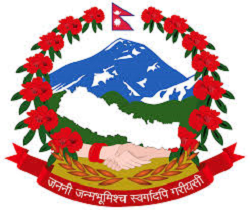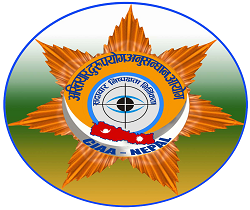Introduction
Commission for the Investigation of Abuse of Authority (CIAA)
CIAA is a constitutional body for controlling corruption by investigating any abuse of authority committed through corruption by any person holding public office.
The provisions of Articles 97 and 98 of the then Constitution of the Kingdom of Nepal (1990) had granted CIAA the status of an independent and autonomous constitutional body. The Interim Constitution of Nepal of 2006 gave continuity to the Commission and the present constitution has provisioned functions, duties and authority to the Commission for controlling corruption. As per the spirit of the constitution, CIAA has adopted punitive, preventive, promotional and institutional capacity development strategies against corruption.
CIAA’s central office is located at Tangal, Kathmandu. It has eight outreach offices in Itahari-Sunsari, Bardibas-Mahottari, Hetauda-Makwanpur, Pokhara-Kaski, Butwal-Rupandehi, Birendranagar-Surkhet, Mahendranagar-Kanchanpur and Nepalgunj-Banke. Nepalgunj Office, Banke serves as the liaison office for CIAA’s Office in Buwal. Article 21a of the The Commission for the Investigation of Abuse of Authority Act, 1991 stipulates that the Government of Nepal shall make arrangements as per the approved posts for the operation of the work of the Commission. As per the provision, a special class Secretary from the Government of Nepal, personnel from the civil service, Nepal Police and other Government services are seconded at the Commission. The Commission for the Investigation of Abuse of Authority Act, 1991, The Prevention of Corruption Act, 2002, The Commission for the Investigation of Abuse of Authority Rules, 2002 and other relevant prevailing laws along with CIAA’s own procedures, directives and guidelines are the base for the Commission to perform by adopting the principles of integrity, fairness and fearlessness.
Provision about Commission for the Investigation of Abuse of Authority (CIAA) in the Constitution of Nepal:-
Part 21 Commission for the Investigation of Abuse of Authority
Article 238. Commission for the Investigation of Abuse of Authority: (1) There shall be a Commission for the Investigation of Abuse of Authority of Nepal, consisting of the Chief Commissioner and four other Commissioners. The Chief Commissioner shall act as the Chairperson of the Commission for the Investigation of Abuse of Authority.
(2) The President shall, on recommendation of the Constitutional Council, appoint the Chief Commissioner and Commissioners.
(3) The term of office of the Chief Commissioner and Commissioners shall be six years from the date of appointment.
(4) Notwithstanding anything contained in clause (3), the office of the Chief Commissioner or a Commissioner shall be vacant in any of the following circumstances:
(a) if he or she tenders resignation in writing to the President,
(b) if he or she attains the age of sixty-five years,
(c) if a motion of impeachment is passed against him or her under Article 101,
(d) if he or she is removed from office by the President on recommendation of the Constitutional Council on grounds of his or her inability to hold office and discharge the functions due to physical or mental illness,
(e) if he or she dies.
(5) The Chief Commissioner and Commissioners appointed under clause (2) shall not be eligible for reappointment.
Provided that a Commissioner may be appointed to the office of Chief Commissioner, and when a Commissioner is so appointed as the Chief Commissioner, his or her term of office shall be so computed as to include his or her term as the Commissioner.
(6) A person shall be eligible to be appointed as the Chief Commissioner or a Commissioner of the Commission for the Investigation of Abuse of Authority if he or she possesses the following qualification:
(a) holding a bachelor's degree from a recognized university,
(b) not being a member of any political party at the time of appointment,
(c) having gained at least twenty years of experiences in the field of either accounting, revenue, engineering, law, development or research and being a distinguished person,
(d) having attained the age of forty five years, and
(e) being of high moral character.
(7) The remuneration and other conditions of service of the Chief Commissioner and the Commissioners shall be as provided for in the Federal law. The remuneration and conditions of service of the Chief Commissioner and the Commissioners shall not, so long as they hold office, be altered to their disadvantage.
Provided that this provision shall not apply in cases where a state of emergency is declared because of extreme economic disarrays.
(8) A person once appointed as the Chief Commissioner or Commissioner shall not be eligible for appointment in other government service.
Provided that nothing in this clause shall be deemed to be a bar to the appointment to any political position or to any position which has the responsibility of making investigations, inquiries or findings on any subject, or to any position which has the responsibility of submitting advice, opinion or recommendation after carrying out a study or research on any subject.
239. Functions, duties and powers of the Commission for the Investigation of Abuse of Authority: (1) The Commission for the Investigation of Abuse of Authority may, in accordance with law, conduct, or cause to be conducted, investigations of any abuse of authority committed through corruption by any person holding public office.
Provided that this clause shall not apply to any official in relation to whom this Constitution itself separately provides for such action and to any official in relation to whom other law provides for a separate special provision.
(2) In the case of the persons who can be removed from office by passing a motion of impeachment under Article 101, the Judges who can be removed by the Judicial Council and the persons who are liable to action under the Army Act, it may conduct, or cause to be conducted, investigations in accordance with the Federal law after they have been removed from office.
(3) If the Commission for the Investigation of Abuse of Authority finds, on investigation conducted pursuant to clause (1) or (2), that a person holding public office has committed an act which is defined by law as corruption, it may file, or cause to be filed, a case against that person and other person involved in that offense in the competent court in accordance with law.
(4) If, on investigation conducted pursuant to clause (1) or (2), any act or action done or taken by a person holding public office appears to be of such nature as to be falling under the jurisdiction of another official or body, the Commission for the Investigation of Abuse of Authority may write to the concerned official or body for necessary action.
(5) The Commission for the Investigation of Abuse of Authority may delegate any of its functions, duties and powers on the conducting of investigations or filing cases, to the Chief Commissioner, a Commissioner or an officer employee of the Government of Nepal to be exercised and complied with subject to the specified conditions.
(6) Other functions, duties and powers and rules of procedure of the Commission for the Investigation of Abuse of Authority shall be as provided for in the Federal law.


